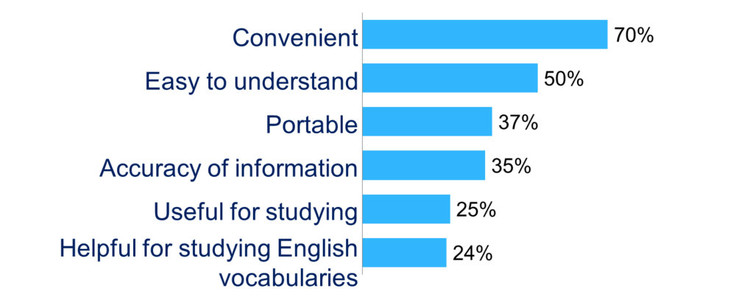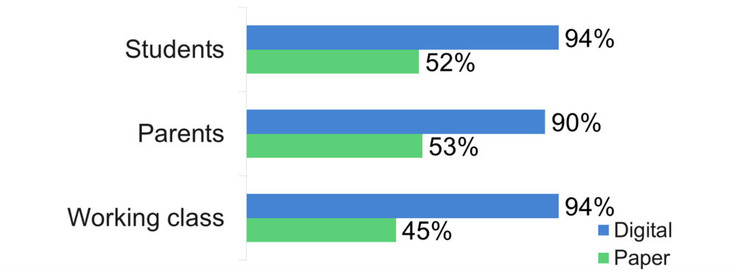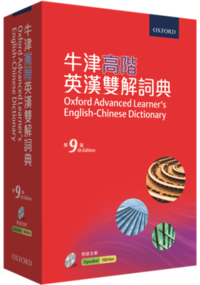
70% of the interviewees have used dictionaries in the past three months.

Regarding the reason for selecting a dictionary, convenience (70%) dominated and even doubled the importance of accuracy (35%).

Four out of five (85%) had the perception that dictionary is more helpful for students.

The comparison of the usage rates of printed and e-version dictionaries.

Convenience outweighs accuracy when checking out definition of words
“Students nowadays are big fans of online resources and when it comes to checking the definition of a word, there is no exception. While we embrace technology, it is of utmost importance to know that convenience does not necessarily come with accuracy in the journey of learning a language. For example, usage explanation and corpus found in convenient online tools are usually not as updated as those in dictionaries. As an educator, we value quality and therefore encourage students to leverage language learning tools of high quality for more effective learning,” expressed Becky Hung, teacher of Wai Kiu College.

(From left to right) Becky Hung, Teacher of Wai Kiu College, Louisa Yeung, Chief Executive Officer of KOS International Limited, Franky Lau, Assistant Editorial Director of Oxford University Press (China) Ltd, Maisan Leung, Assistant Corporate Marketing Director of Oxford University Press (China) Ltd
(Chart 1)

(Chart 2)

Undermineing the true value of a quality dictionary
It is interesting to note that 86% of the respondents seemed to well understand the functionality of a dictionary, including pronunciation (94%) and synonyms (87%), but the majority of them (86%) only used dictionary for the definitions of words, followed by pronunciation (46%) and lexicon usage (38%). It showed a gap between the perceived value of a quality dictionary and its actual usage.
Working people, pay attention!
Improving language skills to achieve career success
 85% of the respondents reverted that dictionaries are more applicable to students. The survey also reveals that almost one-third of the responding employees (29%) have not used dictionary in the past three months. Even among those who have made use of dictionary in the past three months, 61% used it less than once a week. According to Louisa Yeung, Chief Executive Officer of KOS International Limited, the Recruitment Specialist, “For those who want to excel in career and stay ahead of the crowd, it is important to keep improving their language, not only the writing and reading skills, but also speaking and listening skills. In this fast-paced economy, employees should always equip themselves with the essential language skills and most importantly, keep themselves updated to strive for success.”
85% of the respondents reverted that dictionaries are more applicable to students. The survey also reveals that almost one-third of the responding employees (29%) have not used dictionary in the past three months. Even among those who have made use of dictionary in the past three months, 61% used it less than once a week. According to Louisa Yeung, Chief Executive Officer of KOS International Limited, the Recruitment Specialist, “For those who want to excel in career and stay ahead of the crowd, it is important to keep improving their language, not only the writing and reading skills, but also speaking and listening skills. In this fast-paced economy, employees should always equip themselves with the essential language skills and most importantly, keep themselves updated to strive for success.”
To meet the needs of social development, Oxford University Press not only release the ninth edition of the Oxford Advanced Learner's English-Chinese Dictionary, but also the Oxford English-Chinese Dictionaries App.

Now in its ninth edition, the OALD acknowledged the concerns and adopted advanced technologies, such as the brand new Oxford iSpeaker and Oxford iWriter in our latest edition, will make it more than a pure learning tool, but also a great partner for acquiring the essential interactive skills in day-to-day communication.
-
More than 185,000 words and phrases
-
NEW Oxford Speaking Tutor (牛津口語指南) section enables students to prepare for speaking exams and oral presentations
-
REVISED Oxford Writing Tutor (牛津寫作指南) section assists user in becoming a better writer in English
-
UPDATED Visual Vocabulary Builder (圖解詞彙擴充) section expands your topic vocabulary
-
NEW Express Yourself (情景表達)notes help you find the right words for everyday situations
-
NEW Wordfinder (聯想詞) notes help you find words that are related in meaning
-
Brand new Oxford iSpeaker and Oxford iWriter interactively teaches students how to speak and write in different situations
For:
Upper Secondary or above
Working Class

Oxford English-Chinese Dictionaries App
iOS and Android app
Develop your English skills with a range of dictionaries specifically designed for learners
-
Advanced Learner's English-Chinese Dictionary (8th edition)
-
Oxford Learner's Thesaurus (English-Chinese edition)
-
Oxford Collocations Dictionary (English-Chinese 2nd edition)
-
More dictionaries and updates will be added in the future!
|
|
|
|
For:
Upper Secondary or above
Working Class
Proliferation of Instant Messaging Tools Impacts Language Skills
In the Information Age, 72% and 52% respondents are frequent users of instant messaging tools and social media platforms respectively. Almost half of the respondents (44%) considered their language proficiency improved as the use of online communication tools proliferate; while almost a quarter (24%) considered theirs dropped. It reminds us it would be worth to evaluate how the proliferation of different communication tools may impact our language proficiency and communication skills, for now and for tomorrow.
“In reality, many of the ‘digital citizens’ may prefer convenience to accuracy. It is also seen that emoji and over-simplified language instead of complete sentence are taken for instant and casual communication. However, it may be noteworthy to understand that this ‘simplified’ form of communication may have real impact on one’s language proficiency,” expressed Franky, “languages and word banks are ever-evolving, so are dictionaries. For example, more than 1,100 new words and phrases have been added to the Oxford English Dictionary in a recent quarterly update. We therefore highly recommend students and employees to acknowledge and realise the benefits dictionaries can bring, as well as evaluating the quality, authority and history of the options in the market, to fully utilise the tool and to bring language learning to another level.”

